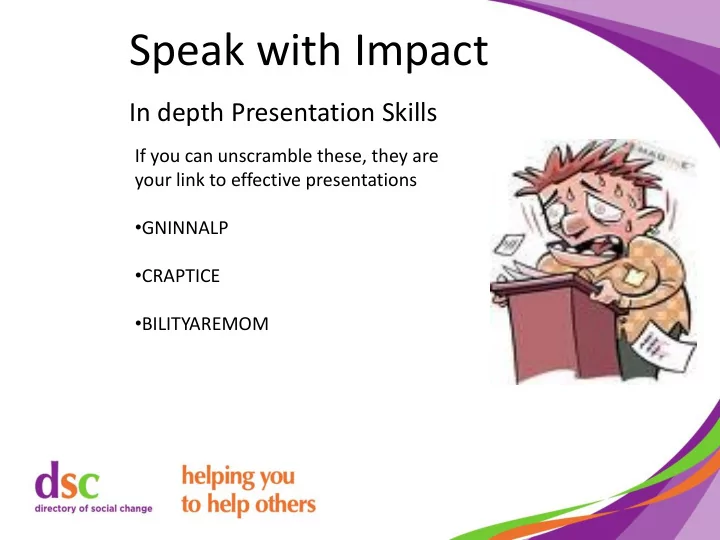

Speak with Impact In depth Presentation Skills If you can unscramble these, they are your link to effective presentations • GNINNALP • CRAPTICE • BILITYAREMOM
Ways of Working Together • Timekeeping • Confidentiality • Respect • Mobiles off • Any question is an OK question • Participation
Interviewer to Chris de Burgh … “and to what do you owe your overnight success?” Chris de Burgh to interviewer … “30 years of long, hard work”
Reviewing what we know • Preparation • Structure • Delivery • . . . Anything else?!
The 6 Universal Questions “I have six honest serving men; they taught me all I knew. I call them What and Where and When and How and Why and Who.” Rudyard Kipling
. . . Aaaahhhhhh!
PATTERN NOTES • All your ideas around a central topic • Categorise • Identify the categories • Prioritise the categories • Sub-prioritise • Reconsider
PATTERN NOTES are useful for: • Preparing a report • Drafting a letter • Revising for an exam • Planning a presentation • Drawing up an agenda • Taking notes at a meeting, lecture etc. • Taking the minutes of a meeting • Planning the day. ‘The human brain can make an infinite number of associations; and our creative thinking potential is similarly infinite’ TONY BUZAN.
Structure • Beginning - Tell them what you’re going to tell them • Middle - Tell them • End - Tell them what you’ve told them
Audiences remember • • First Impressions Symbols/Pictures • • Visual Stimulation Curious, Unusual, Dramatic • • Analogies/Examples Quotes • Anecdotes • Stories • People • Repetition
Beginnings • I nterest • N eed • T ime • R elevance • O bjective
Endings • Summarise • Last thought • Call to Action • Positive • Questions • Thank you
Cue Cards Introduction 1 Materials 9.00 Friends, Romans, countrymen, lend me your ears… • Name • Purpose of presentation •What’s in it for you •What I’m going to tell you • Questions & Handouts
GETTING YOUR MESSAGE ACROSS • VISUAL body language, 55% • VOCAL tone 38% • VERBAL words 7%
LUNCH
So … what makes us nervous?
Warming up the Vocals • Eleven benevolent elephants • Girl gargoyle, guy gargoyle • Rubber baby buggy bumpers • She stood on the balcony inexplicably mimicking him hiccupping and amicably welcoming him in. • Six sick slick slim sycamore saplings.
And more ….. High roller, low roller, lower roller I need a box of biscuits, a box of mixed biscuits and a biscuit mixer He thrusts his fists against the posts and still insists he sees the ghosts Friday’s five fresh fish specials Imagine an imaginary menagerie manager imagining managing an imaginary menagerie
And the old favourite Peter piper picked a peck of pickled peppers. A peck of pickled peppers Peter Piper picked. If Peter Piper picked a peck of pickled peppers, where’s the peck of pickled peppers Peter Piper picked?
Your Turn …! • You have 30 minutes (max) to prepare a 3 – 5 minute presentation to deliver to this group • It can be on any topic you like • Your objective is to persuade • We will use random order for deliver • Remember – this is only practice – the quicker we make mistakes the quicker we learn.
During feedback consider • What can I let them know is working and to keep doing • What do I think would make their presentation more effective • What areas should they take action on • … and the same for you
Developing Your Style Dependant on …. • The audience and setting • The content and time • Your own personality
Ways to engage an Audience?!
Effective Visual Aids • V ibrant • I n Time • S een clearly • U ncomplicated • A ppropriate • L earned in advance
. . . Aaaahhhhhh!
Questions about Questions
Dealing with Hostility • Remember it’s rare • Keep calm • Emphasise points of agreement • Find common ground • If it occurs, it’s aimed at your opinions, not you • If you’re stating facts, back up with evidence • Repeat your case • Stand up to assert authority if sitting down • Stay relaxed and alert • Tell the truth – always • Wait for questions even if they’re not forthcoming
Difficult Audience? And difficult situations?
LUNCH
Final Thoughts… “Amateurs and egotists usually share one fault in common when making a talk. They try to impress rather than express.” Author unknown
Recommend
More recommend